Comply With State Seller of Travel Laws and Licenses

One of the most common questions we get is “Do I need a Travel Agent License?” and the answer is both yes and no. Most new agents are surprised to find out that there is no federal or state licensing of travel agents. This is in part because the industry has been self-regulated by the airline appointing bodies over the decades. However, since the Airline Deregulations Act, travel agencies have moved away from obtaining airline appointments and now there is no one standard for being a travel agent.
To combat this fact, many states have enacted laws that affect travel agents. The trend towards states regulating travel agents seems to have lost its momentum since few states have enacted legislation during the last decade. So here are some of the laws and states that you will need to pay attention to.
General Business Licenses
Each municipality or county may require you to obtain a local business license in order to operate a travel business. Some licenses are required at the state level, such as Delaware. Since local governments treat the revenue generated by the sale of business licenses they generally tend to impose substantial penalties for not obtaining one. To find out what is required for your business just contact your local city hall or county office (if you are in an unincorporated area) and ask what licenses may be necessary to start your business.
Seller of Travel Laws and Licenses
As mentioned above many states have enacted laws regulating the sale of travel. Each State is completely different and may require different action on your behalf to become authorized to sell travel. For complete information regarding your state just click on the state’s name below to access the details of registering. Some states such as Delaware, Louisiana and Hawaii have occupational licenses travel agents must comply with.
Here are the states that have established Seller of Travel laws that travel agents myst comply with.
California
California requires an agent to first join the California Restitution Fund before submitting an application for a California Seller of Travel number. The Restitution Fund is a consumer protection fund that is funded by travel agents to insure that consumers will never lose a dime by dealing with a California based travel agent. The current fee to join the Restitution Fund is $330. There are annual assessments made to replenish the fund.
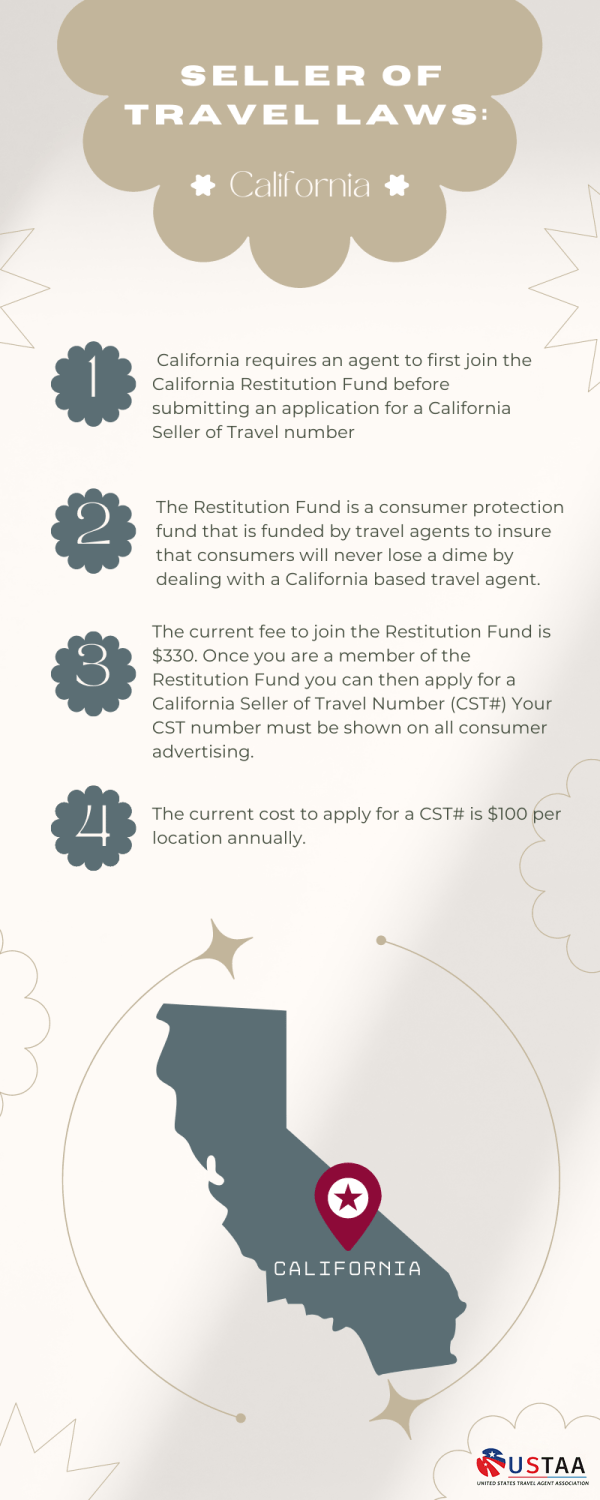
Once you are a member of the Restitution Fund you can then apply for a California Seller of Travel Number (CST#) Your CST number must be shown on all consumer advertising. The current cost to apply for a CST# is $100 per location annually.
Mailing Address
Seller of Travel Program
Department of Justice
300 South Spring Street, Suite 1702
Los Angeles, CA 90013
Phone: (213) 269-6564
Fax: (916) 731-2118
Email: sellers.travel@doj.ca.gov
Florida
Florida requires that travel agents register with the state annually for $300. In addition a bond, irrevocable letter of credit or certificate of deposit may be required, as well.
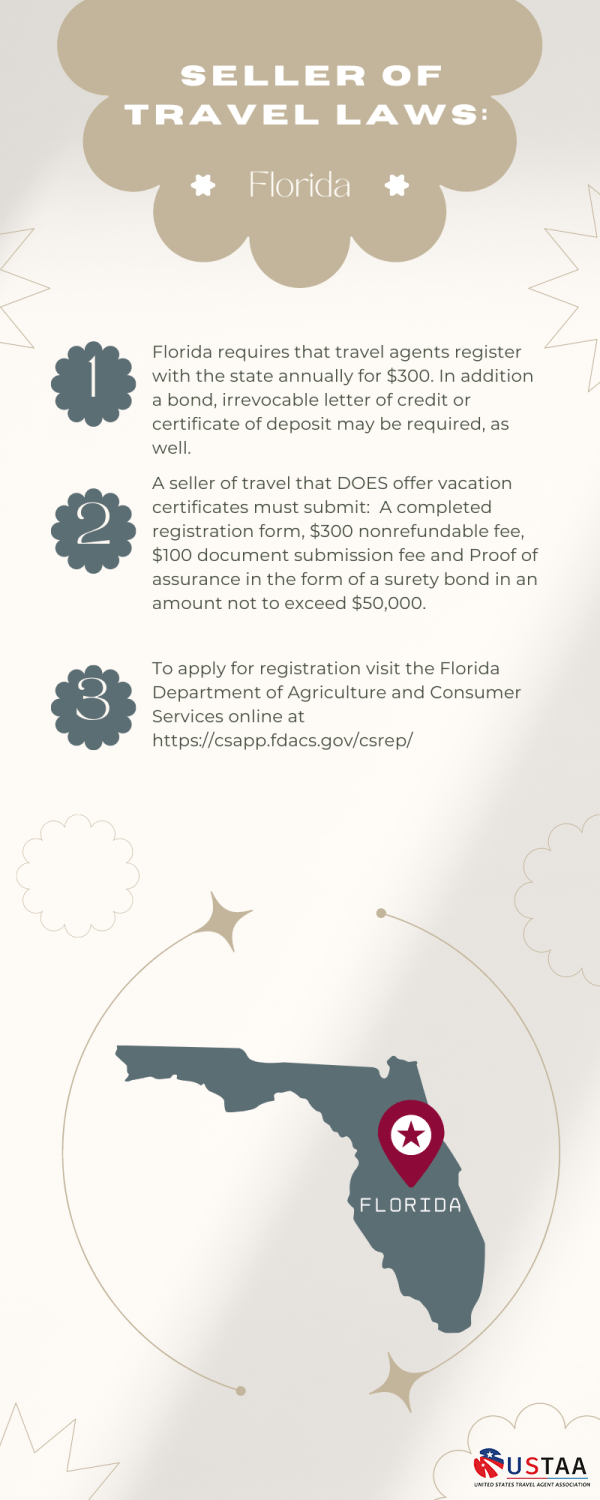
Sellers of travel that DO NOT offer vacation certificates must submit:
A completed registration form, $300 nonrefundable fee and Proof of assurance in the form of a surety bond in an amount not to exceed $25,000.
A seller of travel that DOES offer vacation certificates must submit:
A completed registration form, $300 nonrefundable fee, $100 document submission fee and Proof of assurance in the form of a surety bond in an amount not to exceed $50,000.
Your registration will be denied if:
Registration form and fee are NOT supplied, surety bond is NOT completed properly (seals or signatures by principal and witnesses are missing), or Power of attorney is not included with surety bond.
To apply for registration visit the Florida Department of Agriculture and Consumer Services online at https://csapp.fdacs.gov/csrep/
Hawaii
Hawaii requires travel agents to register with the Department of Commerce and Consumer Affairs. Attach the appropriate fees. Make check payable to: COMMERCE & CONSUMER AFFAIRS. (check must be in U.S. dollars and be from a U.S. financial institution.)
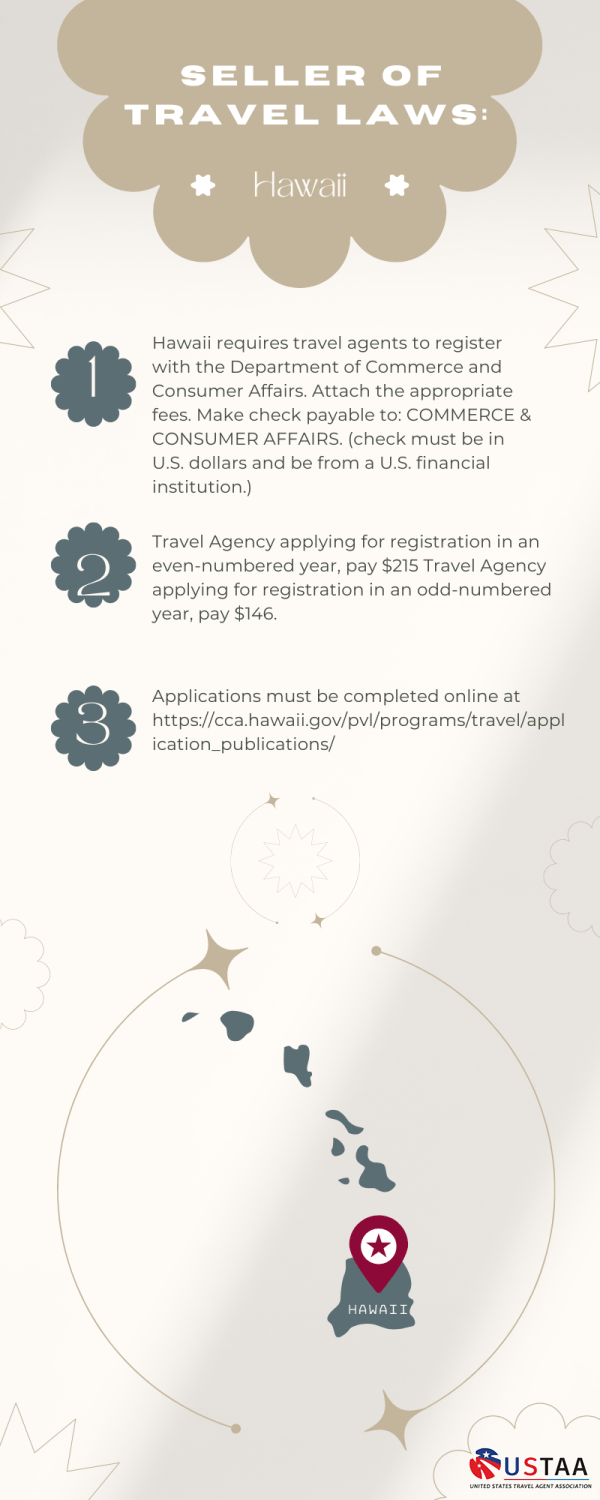
Travel Agency applying for registration in an even-numbered year, pay $215 Travel Agency applying for registration in an odd-numbered year, pay $146.
Application fee is not refundable.
All travel agencies are required to submit evidence of the establishment of a client trust account (which may be either a checking or savings account) with a federally insured financial institution located in Hawaii.
This evidence may take the form of an original letter from the financial institution with the following information:
Name and address of the financial institution
Name on the account (must be identical to the name on the travel agency registration application)
Client Trust Account” designation; When the account was established; and Account number.
Applications must be completed online at https://cca.hawaii.gov/pvl/programs/travel/application_publications/
Illinois
Illinois does not require registration, but has passed the “Travel Promotion Consumer Protection Act” that basically requires you to hold client funds that are residents of Illinois in trust with full disclosure.
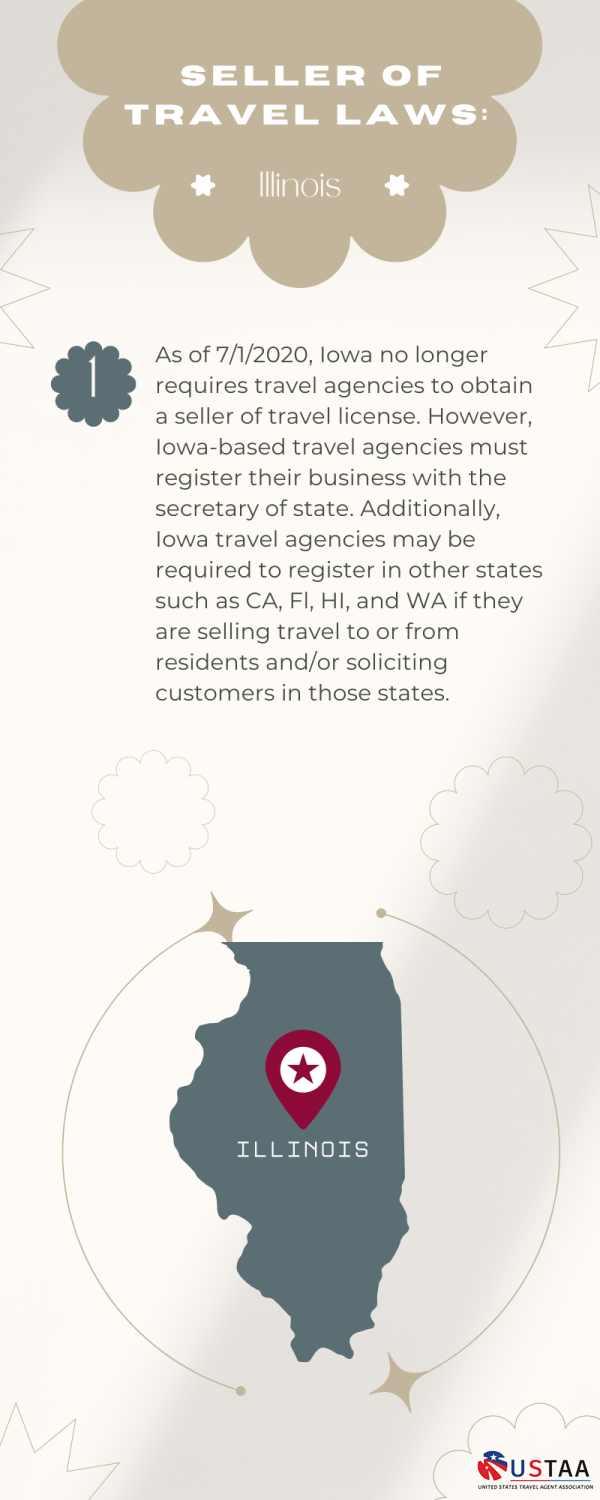
Iowa
As of 7/1/2020, Iowa no longer requires travel agencies to obtain a seller of travel license. However, Iowa-based travel agencies must register their business with the secretary of state. Additionally, Iowa travel agencies may be required to register in other states such as CA, Fl, HI, and WA if they are selling travel to or from residents and/or soliciting customers in those states.
Louisiana
Louisiana requires travel agents to obtain an occupational license before starting their business.
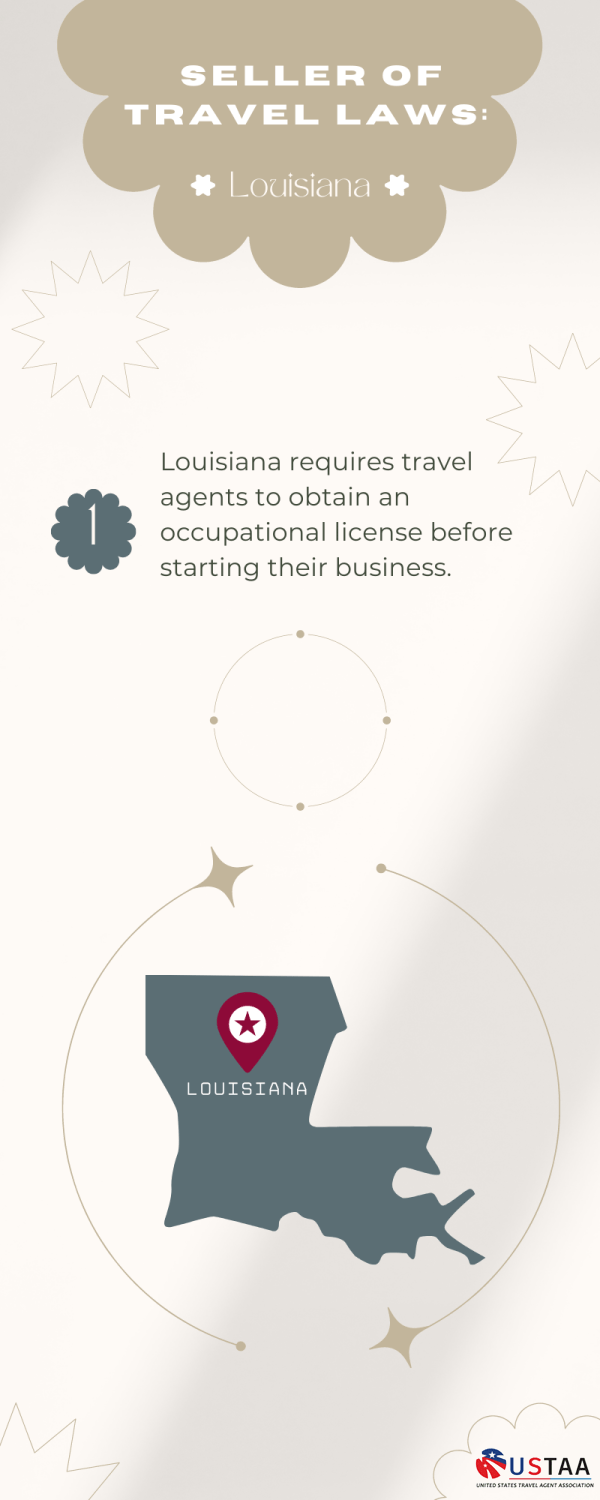
Washington State
Travel Agents selling travel within the state of Washington are required to register as a Seller of Travel and may also be required to post a surety bond or letter of credit. Here are the requirements. Just so you can see how these laws are written and their intent, here is the first part of the Washington State Seller of Travel Law.
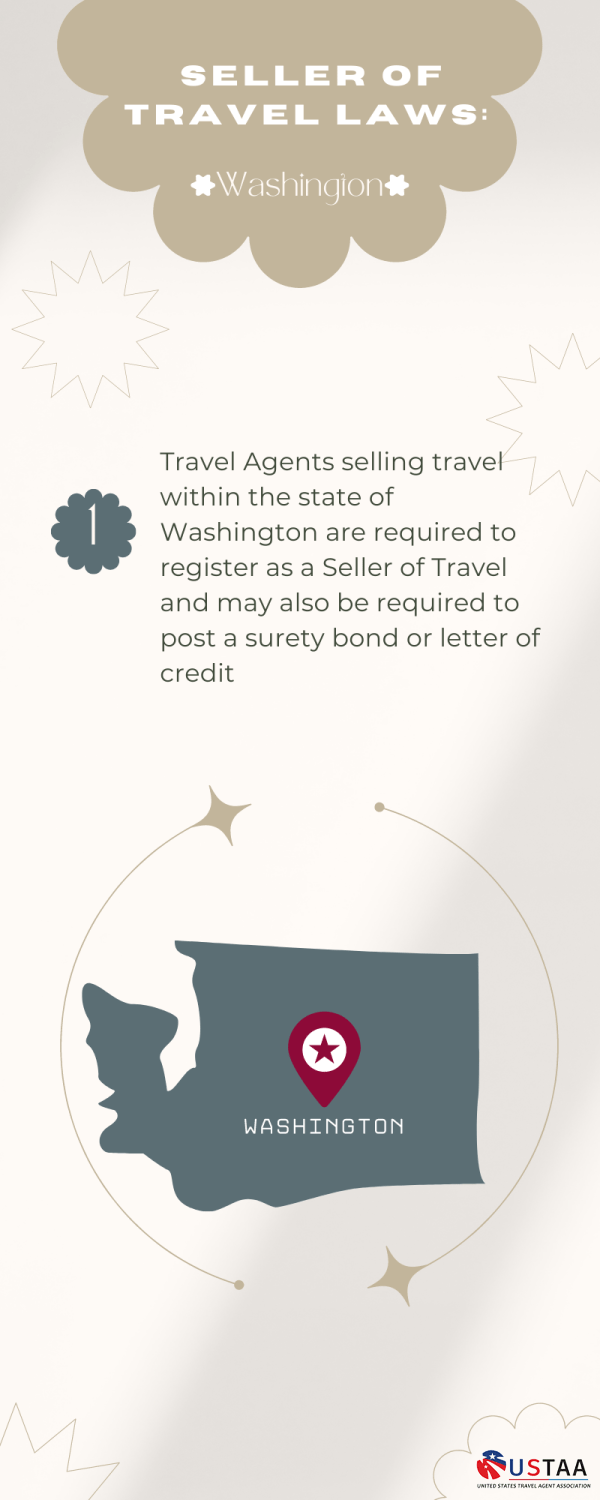
1) A registered seller of travel must conspicuously post their registration number in their place of business.
2) A seller of travel must maintain the required records at the location where the seller of travel is registered for a period of two years after completion of the travel unless a different period is specified by statute or rule. The seller of travel must make the required records available for inspection by representatives of the department.
3) All money received for travel services by the registered seller of travel, their employees, independent contractors, or outside agents (if they are conducting business as a seller of travel in the name of, and under the registration of the registered seller of travel) are to be collected in the name of the registered seller of travel, and processed by the registered seller of travel.
4) At or prior to the time full or partial payment is made by the client/customer for any travel services, the seller of travel must furnish that client/customer a written statement providing the following information: the name, business address, and telephone number of the seller of travel, the amount paid, the date of such payment, the purpose of the payment made, and an itemized statement of any balance due, the registration number of the seller of travel, and the name of the vendor with whom the seller of travel has contracted to provide travel arrangements for the consumer. All pertinent information relating to the travel as known by the seller of travel at the time of the booking must be provided. The seller of travel will make known further details as soon as they are received from the vendor. All information will be provided with final documentation.
5) If payment is made other than in person, the seller of travel will transmit to the person making the payment the written statement required within three business days of receipt of processing of the payment.
6) The seller of travel must provide an advisory regarding the penalties that would be charged in the event of cancellation or change by the client/customer.
7) A seller of travel must maintain client/customer account information including the name of the client/customer, the amount of payment (s) received from that client/customer, the date these payment (s) were received, and the date these payment (s) were disbursed.
8) At the time of registration with the state, a seller of travel must provide the department with the account number for the trust bank account and the name of the financial institution where the trust bank account funds will be held. Should the location of the trust bank account or the account number be changed, the registered seller of travel must notify the department of these changes within one business day of the occurrence of the change.
9) A trust bank account must be established for all moneys received from customers as payment for retail travel services when these funds are held for more than five (5) business days. The trust bank account must be identified as “trust”, and must include the name of the seller of travel as registered. Trust bank accounts must be maintained in a federally insured financial institution located in Washington State, and the director must approve all other alternative accounts. A “trust account” is simply a bank account into which trust funds (and only trust funds) are deposited. It must be a separate, custodial account that provides for withdrawal of funds without delay. By depositing trust funds in trust bank account and keeping accurate records that identify each client or customer, the funds are protected from being frozen, attached, liened, or levied should the licensee become involved in IRS, estate, legal action, become incapacitated, or die. Furthermore, by placing these funds in a separate (trust bank account), licensees are less likely to confuse the trust funds with their personal or business funds, and inadvertently use these funds belonging to clients or customers for personal or business purposes. Terminology for the handling of trust funds Commingling Trust Funds The first is the term commingling funds. This term is defined as mixing the licensee or firm funds with those he/she holds in trust for another. Commingling funds may nullify the protection afforded depositors of a trust account. The licensee or firm’s funds must not be placed in his/her client’s trust account. Funds that are already in a trust account and consequently become the licensee’s or firm’s funds should be removed immediately. Conversion of Trust Funds Another term that applies to trust account handling is conversion. Conversion is defined as a change of character or use to another; an appropriation of something exercising dominion and control over it inconsistent with the true owner’s interest in it. Conversion occurs whenever one client’s trust funds are used for any purpose other than for which they are being held. This might involve the licensee converting the funds for his personal or business use or it might involve the use of the client’s funds for another client’s use. The latter is referred to as a “technical conversion.” An example of what a technical conversion might be is the use of one client’s trust funds to pay another client’s expenses. This is commonly referred to as a “disbursement in excess.” If a licensee maintains a trust account holding funds for several clients, and spends more money than a client has in his/her funds, the licensee is now utilizing one client’s moneys for the benefit of others, and that is considered conversion of trust funds.
10) If the financial institution charges service fees, the seller of travel must reimburse the trust account or other approved account within 10 banking days after the receipt of the monthly bank statement.
11) Trust bank account records to be maintained by the registered seller of travel would include: a check register showing deposits made, and checks written, a monthly bank statement, all canceled and voided checks for each month, and deposit slips (records) for each month for that trust bank account.
12) All disbursements from the trust bank account or other approved account must be identified to a specific transaction.
13) The seller of travel may deposit non-customer funds into their trust account as needed in the amount equal to a deficiency resulting from dishonored customer payments made by check, draft, credit card, debit card, or other negotiable instrument. Documentation is required to support these deposits.
14) The seller of travel may not encumber the funds held in trust, and may not withdraw any of the funds being held in trust. All funds received by the seller of travel from client/customers, as payment for travel services must be deposited into the trust bank account, and referenced to a specific client/customer. The following are the only exceptions that allow the seller of travel not to deposit client/customer funds, or to withdraw client/customer funds, or to make withdrawals from the trust bank account: a. partial or full payment for travel services to the entity directly providing the travel service b. refunds as required by chapter c. the amount of the sales commission d. interest earned and credited to the trust bank account or other approved account e. funds belonging to a purchaser remaining in the trust bank account once all travel services have been provided or when tickets or other similar binding documentation binding the ultimate provider of the travel services has been provided f. reimbursement to the seller of travel for agency operating funds that are advanced for a customer’s travel services g. travel services sold by a seller of travel when payments for the travel services are made through ARC, the Airline Reporting Corporation.
